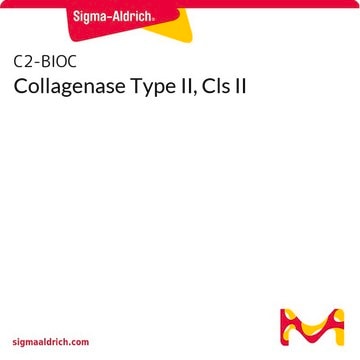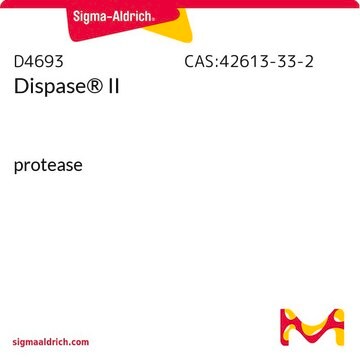C6885
Collagenase from Clostridium histolyticum
suitable for release of physiologically active rat epididymal adipocytes, Type II, 0.5-5.0 FALGPA units/mg solid, ≥125 CDU/mg solid
Synonym(s):
Clostridiopeptidase A
About This Item
Recommended Products
biological source
Clostridium histolyticum
Quality Level
form
powder
specific activity
≥125 CDU/mg solid
0.5-5.0 FALGPA units/mg solid
suitability
suitable for release of physiologically active rat epididymal adipocytes
application(s)
diagnostic assay manufacturing
shipped in
wet ice
storage temp.
−20°C
Looking for similar products? Visit Product Comparison Guide
Related Categories
General description
Application
- for the preparation of arterial tissue for the study of advanced glycosylation end products (AGE)
- for use along with other proteases for the disaggregation of human tumor, mouse kidney, human brain, lung epithelium and many other tissues.
- in liver and kidney perfusion studies, digestion of pancreas, and isolation of nonparenchymal hepatocytes
- for the preparation of viable hepatocytes from rat liver and for the isolation of fat cells from rat adipose tissue
Biochem/physiol Actions
Caution
Unit Definition
Preparation Note
This product also contains clostripain, nonspecific neutral protease, and tryptic activities.
related product
substrate
Signal Word
Danger
Hazard Statements
Precautionary Statements
Hazard Classifications
Eye Irrit. 2 - Resp. Sens. 1 - Skin Irrit. 2 - STOT SE 3
Target Organs
Respiratory system
Storage Class Code
11 - Combustible Solids
WGK
WGK 1
Flash Point(F)
Not applicable
Flash Point(C)
Not applicable
Personal Protective Equipment
Certificates of Analysis (COA)
Search for Certificates of Analysis (COA) by entering the products Lot/Batch Number. Lot and Batch Numbers can be found on a product’s label following the words ‘Lot’ or ‘Batch’.
Already Own This Product?
Find documentation for the products that you have recently purchased in the Document Library.
Customers Also Viewed
Articles
Organoid culture products to generate tissue and stem cell derived 3D brain, intestinal, gut, lung and cancer tumor organoid models.
Organoid culture products to generate tissue and stem cell derived 3D brain, intestinal, gut, lung and cancer tumor organoid models.
Organoid culture products to generate tissue and stem cell derived 3D brain, intestinal, gut, lung and cancer tumor organoid models.
Organoid culture products to generate tissue and stem cell derived 3D brain, intestinal, gut, lung and cancer tumor organoid models.
Protocols
To measure collagenase activity, N-(3-[2-Furyl]acryloyl)-Leu-Gly-Pro-Ala is used in a continuous spectrophotometric rate determination at 345 nm. Collagenase hydrolyzes collagen peptide bonds.
To measure collagenase activity, N-(3-[2-Furyl]acryloyl)-Leu-Gly-Pro-Ala is used in a continuous spectrophotometric rate determination at 345 nm. Collagenase hydrolyzes collagen peptide bonds.
To measure collagenase activity, N-(3-[2-Furyl]acryloyl)-Leu-Gly-Pro-Ala is used in a continuous spectrophotometric rate determination at 345 nm. Collagenase hydrolyzes collagen peptide bonds.
To measure collagenase activity, N-(3-[2-Furyl]acryloyl)-Leu-Gly-Pro-Ala is used in a continuous spectrophotometric rate determination at 345 nm. Collagenase hydrolyzes collagen peptide bonds.
Our team of scientists has experience in all areas of research including Life Science, Material Science, Chemical Synthesis, Chromatography, Analytical and many others.
Contact Technical Service









